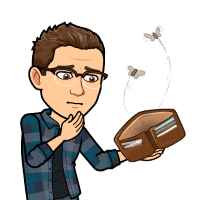“How the hell do you survive as a freelance copywriter?”

It’s hard.
Bloody hard.
There are loads of writers these days, so clients are spoilt for choice for who they want to work with.
In 2018, I was trying too hard to compete, leaving me feeling tired and stressed. I:
- wasn’t explaining to my customers the worth, value and results that quality written content can add to their business
- was undervaluing the worth of my experience and expertise
I was racing to the lowest price to make sure I had work – but it couldn’t last.
In 2019, I learned to stop competing and do things my way.
Surviving 2019 as a freelance copywriter
2019 started with a real kick in the nuts.
The retainer I’d been on for the whole of 2018 came to an end – bye-bye £700 a month.

I could have fallen apart. Instead, it kicked me up the backside and opened my eyes to change.
Here’s what I did:
1. Explained the worth of quality copy
It’s easy to fire back a reply to a query with your quote.
In 2019, I explained the creative process, the worth quality copy can bring and the results and rewards it can bring the client if they choose to invest in my services.

In the past, I was too trigger happy to reply with a price. In 2019 I quoted with a breakdown of why it’s that price and the results it can achieve.
2. Raised my prices
Copywriting is a skill.
Done right, it’s a real investment for a client, but it also takes time to get things right, so the customer gets real value for money.
My prices were too low.
I was working non-stop and only just scraping together enough to cover my mortgage and bills – if that!
However, it didn’t mean I got no work, quite the opposite. I had more interest as clients didn’t see me as the “quick, cheap option”, they said they saw me as:
“A professional who, although more expensive, priced fairly for my expertise and the rewards it can bring them.”
Upping my prices may have lost me some work, but it didn’t put off potential clients from contacting me.
You can find my prices on my services and packages pages.
3. Asked for deposits
It’s standard practice to request a 50% deposit upfront – up to 2018, I was guilty of not asking for one on every job, and I paid the price chasing completion payments for weeks or, in one case, six-months.
If clients won’t pay a deposit, I no longer work with them.
Harsh? It’s not, honest.

A deposit means writers get to cover the cost of living that month and clients are covered in the contract, so if no work is delivered after the deposit, they can take legal action.
I’d never do a runner with the money though, cos I’m not an arsehole.
4. Learned to say ‘no’
Not in a horrible way, but by saying no to work that wasn’t my “thing” meant I passed it onto writers who were experts in a particular niche.
And in return? They gave me work when they were busy or had a query which wasn’t their “thing”.
A win-win.
5. Gave my opinion more on ’24-hour turnaround’ work
Fast-turnaround work happens a lot, but it also means sloppy work that’s never going to be as great as it should be. I was getting a lot of 1500 to 2000-word articles with a 24-hour turnaround – and I was starting to drown.
So, I began to explain why a fast-turnarounds means my clients aren’t getting value for money.

Did clients take the hump?
Nope.
Instead, they started giving me more time to work on what would have previously been a 24-hour turnaround because 24-hour turnarounds, except in the odd case, are rarely that urgent.
Now I’m getting work due by Friday on a Tuesday or Wednesday instead of Thursday lunchtime.
Sure, I still get 24-hour turnarounds and I do them, but they’re fewer now with existing clients.
6. Went ‘old school’ with my marketing
I designed a postcard with my logo, wrote personalised pitches and posted them to agencies across the country in brightly coloured envelopes – oh and I popped in a free packet of sweets too.
Before I knew it, I was getting replies, some positive, some saying “thanks, but we don’t work with copywriters” and one who posted on their LinkedIn page having loved my “old school” approach (you can’t beat free advertising!).
I wanted to try something different and it got me some work which more than covered the cost of the design, sweets and postage.
7. Networked with other freelance copywriters
If you’re not a copywriter, I can’t vouch for your industry, but as a writer, the freelance copywriter community is fantastic.
They’re the biggest asset in succeeding. They offer amazing advice, give you work and will support you at all times.

So, I upped my networking game, surrounded myself with as many writers as I could and ended up with a large community I can call on at any time when I need advice or when I need to let it be known I have availability for work.
Whatever industry you’re in, test the waters at a networking group, your competitors may turn out to be worth their weight in gold.
8. Never stopped getting my name out there
If you’ve seen me on social media, you’ll know I share my blog posts and talk about my services a lot. Lots of people told me I shouldn’t do that.
I ignored them.
The result?
More work through social media than in any other year. People have got in touch saying:
“I’ve followed your tweets and posts for months knowing I’d need a writer this year.”
or
“You’re the most active copywriter out there, so wondered if you could give me a quote?”
Aces!
It’s landed me work with clients who are pretty much my friends now.
When you’re busy, it’s easy to forget to keep getting your name out there, so even when you’re snowed under, it’s imperative you never disappear because when work dries up, you’ll end up with nothing.
Will this work for everyone?
Not necessarily.
Every person and business is different.
However, what improved my workflow was:
- focusing on the results my work can bring customers
- explaining the creative process
- getting my name out there
I was able to build up a better rapport with customers and produce quality work, so they got real value for money.
Well, that’s 2019 in the bag.
Now it’s about getting through 2020.
